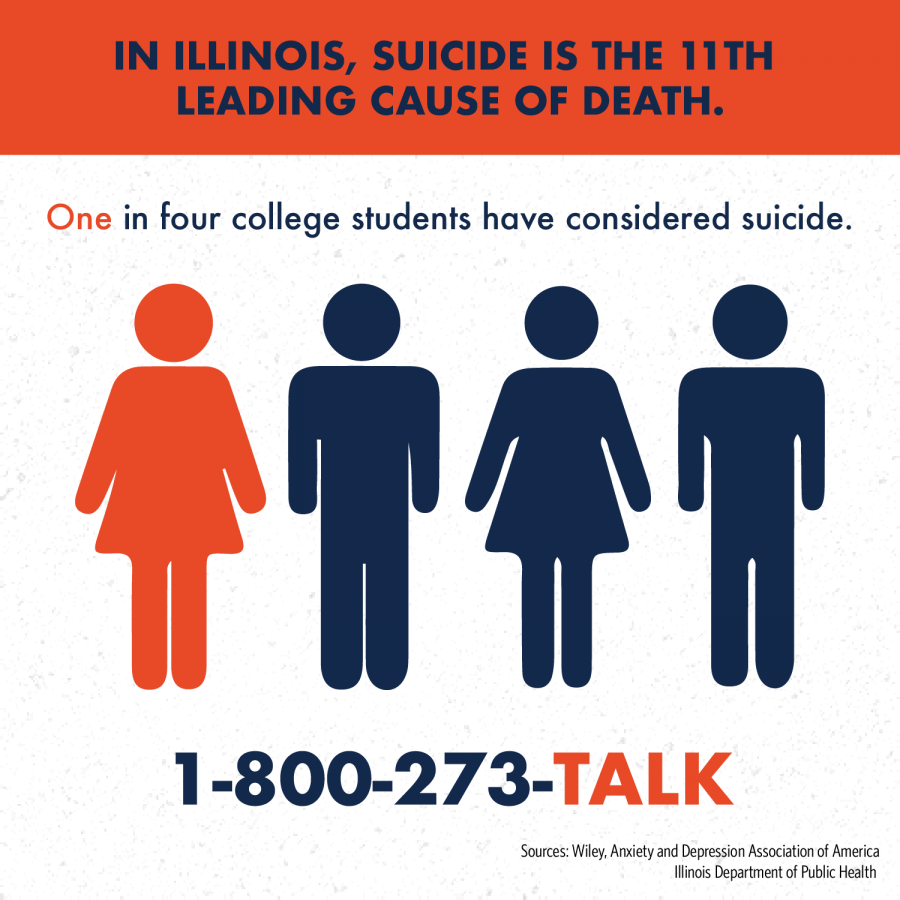UI addresses Suicide Awareness Month
September 19, 2019
The University’s Counseling Center and Student Assistance Center emphasize the importance of addressing mental health and suicide, especially in the month of September, National Suicide Prevention Month.
According to the Illinois Department of Public Health, in the state of Illinois, “suicide is the 11th leading cause of death resulting in more than 1,000 deaths each year.” A study from the Anxiety and Depression Association of America found one in five college students has considered suicide.
Nichole Evans, assistant director of Outreach and Prevention at the Counseling Center, said although the stigma attached to suicide has decreased, it still exists, even more so in certain communities.
“It’s important to be able to address suicide openly because when we do that, it can remove some of the shame people can feel about it, and it makes it easier for people who are struggling to get help,” Evans said.
The Counseling Center has not reached the recommended clinician-to-student ratio yet, and the staff is experiencing a growing demand for its services.
Get The Daily Illini in your inbox!
However, the center currently has 31 full-time clinicians, which is more than last year, and several part-time clinicians who fill some of the staffing gaps.
Evans said one of the ways the office deals with the staff shortage is with the triage team, whose main role is to help students who come in without a scheduled appointment because they feel they are in crisis.
In addition, the team helps those who call after appointments have filled for the day. They are then given the option to speak to a counselor on the phone or through a brief in-person meeting to discuss how to manage their mental health until they can schedule an additional appointment.
“It’s important to note that we have a same-day scheduling policy because it allows students to get in right away when their concerns are the most urgent,” Evans said.
The center is also in its second year of the Embedded Counselor program, which places counselors at multiple colleges across campus.
“From a space perspective, we can add more counselors to our staff without having to find additional offices for them in our main office, which is at capacity,” Evans said.
The Counseling Center will hold various events in the next few weeks to raise awareness for Suicide Prevention Month. During the University’s Suicide Prevention Week from Sept. 30 to Oct. 4, the center will be having informational social media events and campaigns to inform people about suicide warning signs and how to help peers find available campus resources.
The Student Assistance Center, which is part of the Office of the Dean of Students, also works to provide assistance to students. One of the many reasons students may contact the center is due to academic difficulty caused by physical or mental health issues.
Rhonda Kirts, associate dean of students, said the deans in the center are notified by faculty, staff, students or students’ families if they have concerns about a student. The deans will meet with the student and connect him or her to the appropriate unit, whether that be the Counseling Center, Disability Resource Services or McKinley Health Center.
“The Student Assistance Center deans will contact a student to meet and connect the student with the appropriate University unit — Counseling Center, Disability Resource Services and McKinley Health Center,” Kirts said. “If a student is experiencing a situation where they may be away from class, the Student Assistance Center will notify instructors or provide an absence letter if the student provides appropriate documentation.”
Evans said the habits students develop in college often continue throughout adulthood.
“We believe that providing education about forming positive mental health practices is an integral part of Illinois students’ education,” Evans said.
Editor’s note: The infographic for this article incorrectly states the number of college students who have considered suicide. The infographic should state that one in five college students have considered suicide. The Daily Illini regrets this error.







